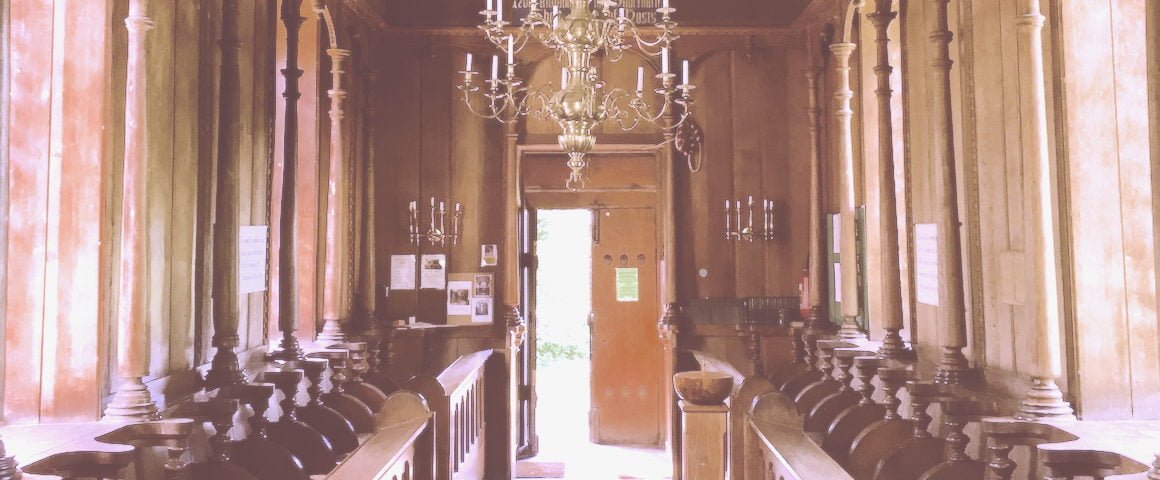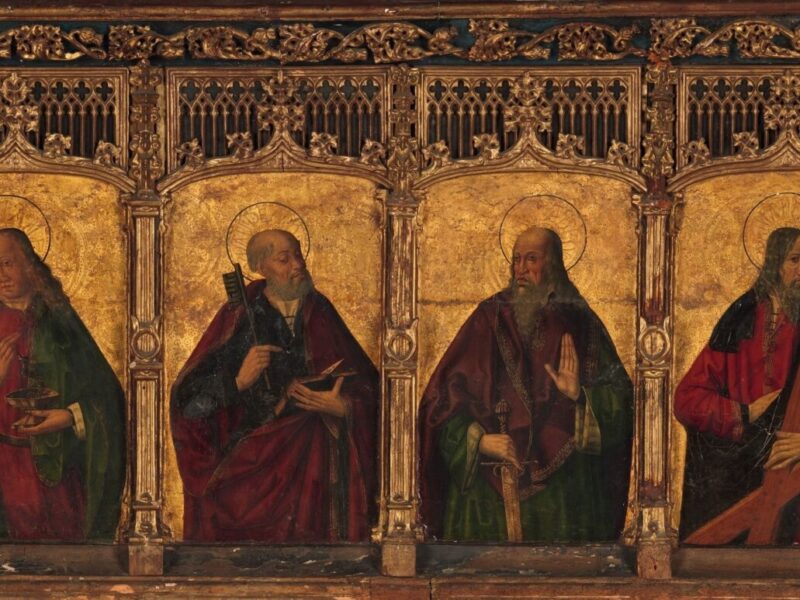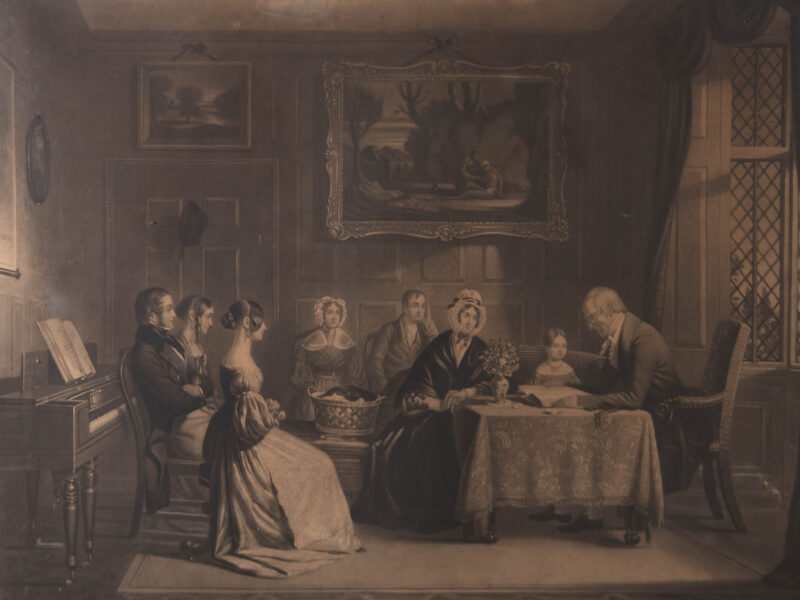GLORY BE TO GOD IN THE HIGHEST AND ON EARTH PEACE GOOD WILL TOWARDS MEN.
TO THE
Devout Perusers
Of the following
TREATISE
Dear Friends, Christian Brethren, and Fellow Servants:
I hope this my design and desire in publishing this small book, being to promote the glory of God among you, will not be unacceptable to you; nor this method. I propose to do it be disagreeable, or uneasy, when you shall have made trial of it, and been some time versed in it. It is not any new or unpracticable thing I propose to you, but what the primitive and most sincere Christians were trained up in from their admission into the body of Christ. And the matter of the devotion I recommend to you, being chiefly taken out of our most excellent liturgy, it will make the actual performance very easy to you. For it is what you are already acquainted with and what I hope both you and your households have already, for the most part, by heart; (especially the Belief, the Commandments, the Lord’s Prayer and Suffrages which is the substance of all the rest). This your long and continued practice in the Church, must needs produce, where I am sure you are safe, and whereby you will be out of danger of error, if you firmly adhere to her doctrine and discipline, in these perilous times. And I trust the enlargements upon them, are perfectly agreeable to the same analogy of doctrine. And so I hope they may assist you in the understanding the former, and in some measure enlarge your minds in the practice of them both.
The treatise before the devotions you must look upon as the preface to them. It contains my thoughts on this subject, of nearly twenty years ago. And it was penned soon after my entrance upon a conjugal state. I suppose seven years before my entrance in holy orders, though now much abbreviated, and somewhat altered. Therefore if you meet with any slips of my pen then, or escapes of my notice since (in my cutting off much of it to make it less cumbersome, if not more useful,) I hope you will as kindly pardon it, as it is kindly intended and presented to your service.
But that I may prevent misunderstanding as much as may be, I shall give my reasons for some things I find most liable to misconstruction.
1. If the name of monastery be offensive to any, as a popish name I answer, I have a very reverend and pious bishop for my example, but applied to single persons, i.e. Bishop Duppa. And it being joined with the protestant name, I doubt not but it may be as innocently used to distinguish it from the Romans as the word church or faith may be, in the like distinction of popish and protestant. And if I have not sufficiently declared my dislike to the Roman abuse of the thing, I know not how to do it more emphatically than by such a distinction. It being the Romish abuses, and not the thing itself I dislike.
2. Again, whereas I say (p. 2d.) That some have thought they have traced a monastic life as high as Joseph. I find it was Hofpian that led me to that Sentiment, in his First B. De Monachatu. C. 6. But I since find by Bellarmine T.2. L.2. C. 5. That some deduce its original from Enos.
Page 3, 9, and 10. What is said of monks in general is meant principally of the Mendicant friers.
Page 35. What I say there, reflecting on non-resident bishops, I would not have it thought, that I said it in view of any protestant bishop I know, for I know none such at present, and I hope never shall. It was the titular bishops of the Church of Rome, in Pertibus infidelium, as they are called, and the uncanonical residence of many others of them in the Court of Rome, and of other great princes, far from their dioceses, that I aimed at. For the face is true in them, and I know no other it can so justly be applied to. But a fault it must be owned to be, whosoever is guilty of it, whether popish or protestant bishop, priest or deacon.
Page 42.3. If some of the clergymen’s ladies are offended at what I there say, I hope the rest who do not deserve the rebuke will excuse it, and those who do deserve it will patiently bear it till they mend it. For it is the very first promise their husbands made, when they first entered into holy orders. To frame and fashion their own lives, and the lives of their families according to the doctrine of Christ. And to make both themselves and them as much, as in them lies wholesome examples of the flock of Christ.
Page 49. What I there say concerning clandestine marriages, is less needful now. For the danger is not so great by licenses since the late statute was made to prevent them, as before, when this was written.
As to other literal and verbal mistakes, I hope most of them will be corrected in the errata. And the rest the reader will either mend as he meets them, or pardon if he please.
I do not foresee any offense the devotions themselves can justly give to any devout person of the Church of England, for whom they are designed, as to others, they may bear with me, if they please, and if they raise captious disputes about them, they shall trouble themselves more than me.
With respect to the practice of them, it may not be amiss to observe: that though they are principally designed for states family-devotions, yet they may also be used in private closets by single persons, without any considerable alteration. Especially the enlargements by those who have much time and leisure, since our Savior has taught us to pray in the plural number, in his must excellent pattern of all prayer. Thus widows and virgins, and all single persons, who have not the convenience and happiness of the united devotions of an unanimous family. Thus the several offices for night would be pious employment and entertainment, for soldiers, and such as watch with the sick, and the sick that cannot sleep themselves.
The hymns, if adapted to short chanting tunes, (such as some I have added at the end, being most easy to be learned) may well suit a Christian labourer’s practice, in the cornfield, meadows and weeds, that whilst he hears the birds and every creature praising their Maker, he might not be silent either in heart or voice. Whether he strictly observes the times of them or he is not so material, though by so doing they would best adorn each other and suit the stated times of devotion agreeable to antiquity. And if any will be at the pains to get them by heart, they would be proper meditation and pious divertisements at any time.
When the first hour of prayer is used on the Lord’s day, it would be convenient to use the first lesson according to the day of the month, and the same on the Lord’s day in the evening. So two chapters will not be missed every Sunday, but the whole will be read in the year without interruption. And for the other lessons I would recommend the epistle and gospel, which are chosen scriptures appointed by the Church for that whole week’s meditation.
I have added no office for the sick, because it is the office of the master of the family then to send to the minister of the parish to pray with the sick, and to receive his directions therein.
I shall only add by way of encouragement that the practice of what is here proposed wants not a trial, it having been generally used in my family near twenty years last passed. And I ever observed, that the more close my Servants kept to their rule of devotion, the better servants, and in every station they were: and the more quiet and smoothly the domestic concerns went on. I cannot say but too many avocations and interruptions, by reason of the various cares, and accidents of this mortal life will interpose and prevent. But every little stumbling block must not discourage us from our constant endeavors to proceed again on our way, in running with patience the race that is set before us.
But to conclude, I must assure you, that the reasons of my publishing this little tract was not because I think it in any manner to excel the meanest performance of this kind extant. For I am sensible there are many excellent books of devotions done by very reverend, pious and learned men in all things surpassing my mean capacity. But as I knew those cannot be in all hands, either for want of number of them, or many persons ability to but them. So I was in hopes this might be doing some good, where more worthy helps were wanting, and might find some value for the good design it brings, or for the variety of the dress though more plain and humble, or at least be acceptable because as an amicable Present, it comes gratis. For as my station and circumstances often call me to divers places, both North and South, and my relations of several sorts very numerous, I designed this as a companion of my journeys, and as I pass along to be, though a small yet a charitable present, whereby I earnestly desire to express my ardent wishes for their spiritual and eternal welfare. And thus if in any measure, it be instrumental to the setting forth the glory of God, by adorning our most holy profession, in his eternal Son, our most dear Lord and Savior, our most kind Master and Benefactor. And to the assistance but of one precious soul in the way to everlasting life, by the most gracious assistance, and vigorous influence of the all Holy Spirit, both my fervent desire and design will not be altogether frustrated. Nor shall I think my labour to have been in vain in the Lord. To whose most gracious protection, favor, and everlasting benediction, you are most earnestly recommended by
Your most Affectionate
Friend, Brother, and
Fellow-Servant in Christ,
Geo. Wheler.





'The Protestant Monastery by George Wheler' has no comments
Be the first to comment this post!